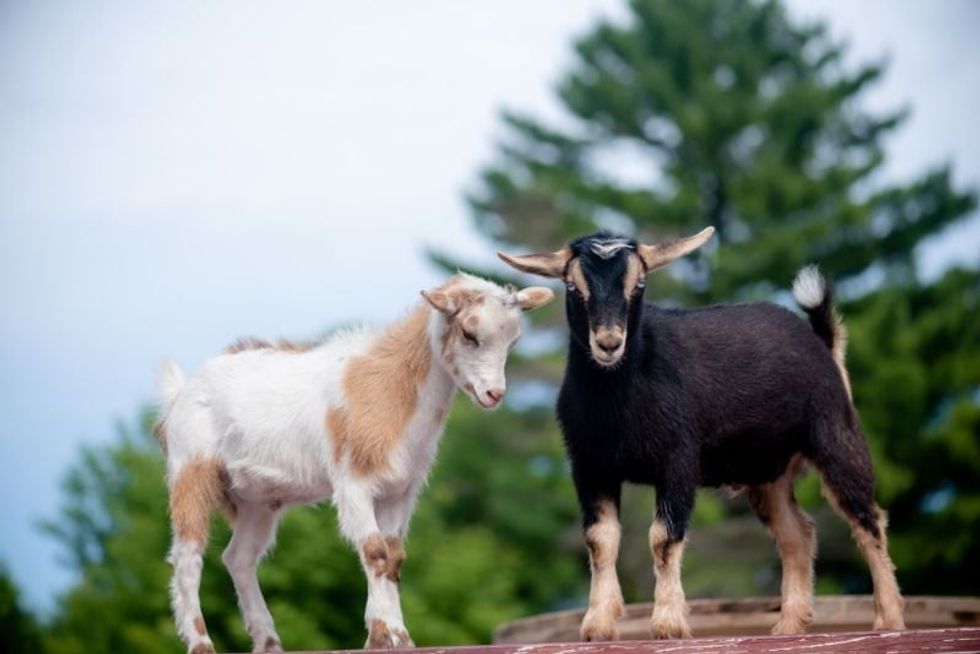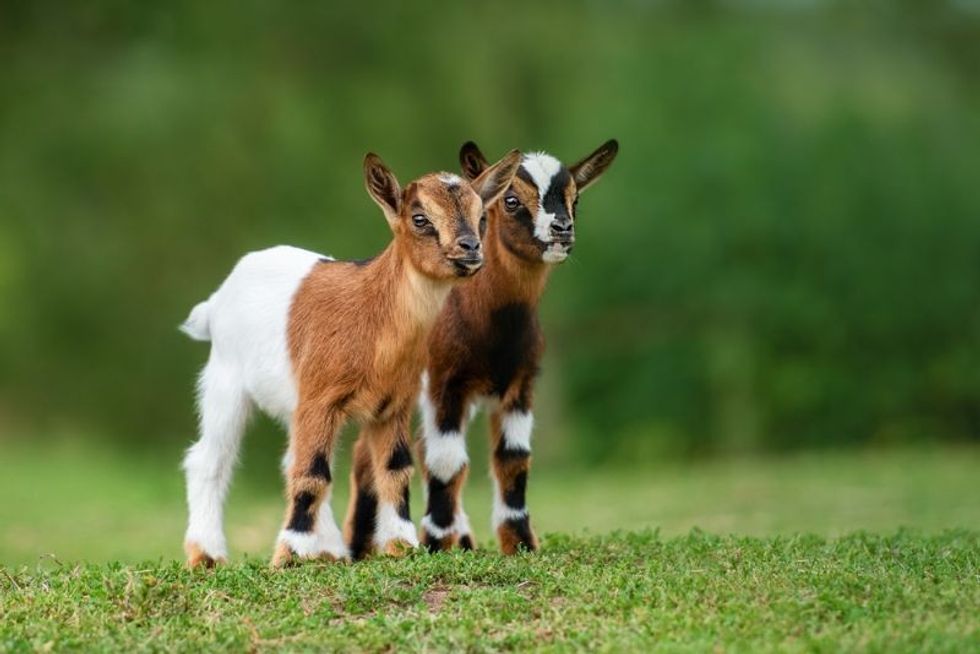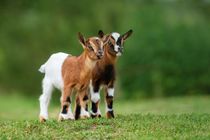Everything You've Wanted To Know About The Smallest Goat Breed!

When it comes to miniature goat breeds, the Nigerian Dwarf is one of the most popular, as well as one of the most expensive.
The Nigerian Dwarf goat is a tiny dairy breed capable of producing up to two quarts of fresh milk each day. Not all goats are dairy breeds, and those that are actually dairy goats usually cost significantly more than non-dairy varieties.
The Pygora is the tiniest of all the fiber breeds raised on a farm. Their meat is said to be succulent and flavorful.
In addition, the Pygora has the ability to produce up to a quart of milk every day. The milk of the Pygora breed is sweet and high in protein, similar to that of the Nigerian goat. Even while it isn't as sweet as Nigerian goat's milk, it is still incredibly tasty.
The Pygmy goat is considered inefficient and not worth your effort. These pet animals are, nevertheless, frequently raised as a source of meat for farmers and other people. In fact, of all the meat breeds, the Pygmy goat is the tiny breed.
The Pygmy goat's true distinguishing attribute is its playful nature. This breed produces excellent pets and is a fantastic asset to any farm. After reading about pygmy goat breed and miniature goat breed, also check out what do goats eat and how to milk a goat?
What goats stay small forever?
Mini goats are the ideal compromise for individuals who prefer large animals to remain cute throughout their lives. Let me introduce you to five different varieties of tiny goats that make fantastic companions.
If you like goats, tiny goats can be a good pet for you. So, you might be wondering, what is a miniature goat? Is this the world's smallest goat breed? Here are five of the world's smallest goat species.
Pygmy Goat: Pygmy goats are originally from West Africa, namely Cameroon, and are mostly maintained for local milk and meat production, but that is not why we are here: these milking animals are also highly friendly creatures who, due to their submissive character, make excellent pets! They enjoy receiving and returning frequent affection.
If you're thinking about getting one, you might wonder how big Pygmy goats are.
You should be aware that a full-grown Pygmy goat can reach a height of approximately 20 in (51 cm), therefore they don't require much space when being reared. In addition, Pygmy goat milk contains more calcium, potassium, phosphorus, and iron than full-sized goat milk.
Nigerian Dwarf Goat: The Nigerian Dwarf Goat is also known to belong from West Africa. Nigerian Dwarf goats can reach a maximum height of 22.5 in (57 cm).
They're so adorable because they're so bright and friendly; you'd almost want to sleep with them at night!
They're also a very social species of goat, which is why they're popular as show goats, household pets, or hobby goats. Nigerian Dwarf goats, like Pygmy goats, are frequently used as milking goats: if properly fed, these milking animals will produce butterfat-rich milk, which is ideal if you plan to make your own goat butter.
Kinder Goat: Kinder goats are a crossbreed between a Pygmy goat and a Nigerian Dwarf goat. They only weigh roughly 115-135 lb (52-61 kg) making them the ideal type of goat for a small garden.
This dairy breed is really delicate and easy to care for, much like the last species we discussed – and any kind of small goat for that matter. Aside from being one of the most social pets, kinder goats provide a fantastic source of butterfat-rich milk.
Pygora Goat: Let us leave Africa and travel to the United States, where the Arizona Reservation, in need of textile fiber, began breeding Pygora goats by crossing Pygmy goat males with full-sized female Angora goats, resulting in a puffy and fluffy new breed.
These breeding animals can generate a variety of fibers, including mohair (like full-grown angora goats), cashmere, and even a mix of the two.
Pygora goats have bigger size and weight disparities between does and bucks than other tiny goats: a Pygora goat size can reach 23 in (58 cm) for does, and a Pygora goat weight can reach 65-95 lb (29.5-43.1 kg).
Nigora Goat: Nigora goats are related to Pygora goats, however, they are the result of a cross between Nigerian Dwarf bucks and Angora does. As a result, they are remarkably similar to the preceding ones, with the exception of their slightly reduced weight.
Nigora goats produce superior milk while growing the same type of fiber as their cousins.
They're also easier to care for, which is why we recommend them as pets over Pygora goats. They're both considered really nice and cuddly, but Nigora goats are a little less stubborn.
Is there a mini goat?
Miniature and standard-size breeds of goats are available. Standard-size breeds, such as the Nubian or Alpine, can weigh up to 90.7-200 lb (41.1-90.7 kg). Because of the many regulatory restrictions on goat size and weight, mini-goats such as the Pygmy and Nigerian Dwarfs are more popular in metropolitan settings across Africa and other regions in the world.
If your backyard barnyard is also little, make sure the 'child' goat or goats you bring home will not grow up to be larger than you anticipated. Baby goats are called kids, female goats are called does, uncastrated males are called bucks and castrated males are called wethers.
Goats were once uncommon as pets, but mini goats or dwarf goats have grown in popularity as a result of their cuteness, docility, and small size. These five species of tiny goats will attest to the following: These dairy animals are small, about the size of an adult dog, and stay that way for the rest of their lives.
As a result, the smallest goat breeds are the most popular in cities and suburbs. Your best options will be goats like the Pygmy goats as the smallest meat-producing breed, Nigerian Dwarf goats (also known as smallest dairy goats breed), and Pygora goats which are also considered as the smallest fiber breed.
Why are some goats so small?
While miniature goat breeds are ideal for individuals with a small yard, they should not be limited to those with a small yard. Mini breeds are a great complement to any farm of any size.
Pygmies are an African breed as well. These mini farm animals can weigh up to an average of 85 lb (38.6 kg), which is somewhat greater than the Nigerian Dwarfs. This meat-producing breed is short and stocky.
These goats are small because they don't tend to produce a lot of milk and have tiny teats, they're usually raised as pets or companion animals. They're also used to cross-breed with larger goats to produce miniature copies of the larger breed.
Do they make better pets?
Miniature goats are not only considered adorable pets, but they also produce milk with high-fat content. Pygmy goats are a robust breed that can adapt to a variety of habitats.
These goats could make an excellent companion for anyone who is willing to care for them and put out the effort to raise them. They require adequate housing and care. Because they are cute and enjoy playing, these little bundles of pleasure provide endless entertainment. Chickens and livestock are not a problem for Pygmies.
They can be trained in the same way that any other pet can. Furthermore, they are excellent companions for both children and the elderly.
They don't eat anything that falls to the ground when it comes to food. As a result, you'll need to feed them with a special spoon and make sure they don't fall over while eating.
Overall, Pygmy goats are excellent pets if you know how to care for them and give them the attention they require.
If you are looking to adopt a registered purebred teacup goat, you can expect to pay somewhere around $500 to the breeder.
The Difference In Small Goat Vs Big Goat Temperament
Goats are considered persistent, intelligent, tenacious, and determined creatures. If they desire something, there's not much that can stop them from pursuing it. Goats are notorious for escaping, so if you plan on keeping huge goats, you need to be prepared to invest in heavy-duty fencing.
Compact goat breeds like the Nigerian Dwarf and Pygmy can be kept in small spaces. Goats are quite adaptable in terms of habitats, and they may be raised in a variety of environments with proper care and attention.
Larger goat breeds, such as Nubian, Boer, Alpine, or Saanen, will benefit from more space. Goats that are confined and bored will become destructive and difficult to handle.
Small goats can be a lot of fun, which is excellent because their tiny size allows them to be more boisterous without causing too much damage.
Goats that are grown for meat or dairy will require more feed than goats that are kept as pets. Grain, alfalfa, and grass hay are all good options.

What do you need to know before adopting a goat?
People consider getting backyard goats for a variety of reasons, including milk, entertainment, and friendship, as well as weed control. However, before you purchase a goat, you should learn how to keep them healthy and happy. Here are some things you should be aware of:
Fencing: Goats love to rub against fences, especially when they're shedding, or try to get their heads through any openings in order to eat something tasty that's just out of reach. Goats are also cunning when it comes to escaping their confinement.
All of this implies that goats are particularly tough on fences. It must be strengthened with solid wood posts buried deep in the ground and escape-proof, with slats close enough together to prevent their heads from slipping through.
It should also be tall enough to keep them in.
If you're going to use wire, make sure it's strong enough to prevent a goat from bending it or pushing it down and escaping. Goats also enjoy chewing wood, so be prepared to rebuild your wooden fences every few years if you have them.
Fussy Eaters: Most individuals don't have enough foliage in their backyards to provide a goat its whole diet, so they must supplement with hay, grains, greens, and plenty of fresh water.
Goats will consume most things in your yard, including grass, weeds, shrubs, trees, and flowers, but they eat in patches, so they won't keep your grass trimmed or your hedges tidy if that's what you want.
If you're going to have goats on your property, keep them away from your prize roses and keep in mind that many attractive bushes, such as azaleas, rhododendron, mountain laurel, and ferns, are poisonous to goats.
If you have goats, keep them away from these plants and make sure they don't eat them.
The most important thing to remember about goats is that, while they are adorable and can be a lot of fun, they require a lot of thinking and attention to be properly cared for.
All goats require fresh hay and grain on a regular basis, and they consume a large amount of food, so be prepared to frequently transport big hay bales and pellet bags to the goat yard.
All goats require more, higher-protein grain as well as supplemental minerals, particularly copper, which can be administered in the form of a loose powder or a compressed brick salt lick. Consult a goat-savvy veterinarian for advice on what to feed them, how much to feed them, and what supplements they need.
Feeds or supplements designated for sheep, horses, or other livestock are not necessarily safe for goats.
Keeping Small Breed Goat Tips
Some of the five good reasons to raise a miniature goat:
They're adorable. It's difficult to dispute that miniature goats are not charming. Even if you aren't interested in goats for their use, they make excellent pets and are really cute!
They consume fewer calories. Smaller tummies necessitate less food, which might help you save money.
They don't require as much space. Smaller goats, as previously said, can thrive on smaller pieces of grass.
They don't require as much fencing. Because there is less pasture, there is less fencing to erect. You can also use shorter fencing for a lower cost. Smaller breeds can also be housed in smaller spaces. A tiny breed will appreciate the shelter provided by a recycled doghouse.
They are less difficult to handle. Goats may be stubborn, but a 50 lb (23 kg) goat enjoys jumping and playing just as much as a 200 lb (91 kg) goat. Fencing and buildings are less worn by smaller breeds.
Here at Kidadl, we have carefully created lots of interesting family-friendly facts for everyone to enjoy! If you liked our suggestions for the smallest goat breed then why not take a look at mountain goat horns, or Nigerian Dwarf goat facts.
We Want Your Photos!
More for You
Doctorate specializing in Veterinary Medicine

Oluniyi AkandeDoctorate specializing in Veterinary Medicine
With an accomplished background as a Veterinarian, SEO content writer, and public speaker, Oluniyi brings a wealth of skills and experience to his work. Holding a Doctor of Veterinary Medicine degree from the University of Ibadan, he provides exceptional consulting services to pet owners, animal farms, and agricultural establishments. Oluniyi's impressive writing career spans over five years, during which he has produced over 5000 high-quality short- and long-form pieces of content. His versatility shines through as he tackles a diverse array of topics, including pets, real estate, sports, games, technology, landscaping, healthcare, cosmetics, personal loans, debt management, construction, and agriculture.
Disclaimer
1) Kidadl is independent and to make our service free to you the reader we are supported by advertising. We hope you love our recommendations for products and services! What we suggest is selected independently by the Kidadl team. If you purchase using the Buy Now button we may earn a small commission. This does not influence our choices. Prices are correct and items are available at the time the article was published but we cannot guarantee that on the time of reading. Please note that Kidadl is a participant in the Amazon Services LLC Associates Program, an affiliate advertising program designed to provide a means for sites to earn advertising fees by advertising and linking to Amazon. We also link to other websites, but are not responsible for their content.
2) At Kidadl, we strive to recommend the very best activities and events. We will always aim to give you accurate information at the date of publication - however, information does change, so it’s important you do your own research, double-check and make the decision that is right for your family. We recognise that not all activities and ideas are appropriate for all children and families or in all circumstances. Our recommended activities are based on age but these are a guide. We recommend that these ideas are used as inspiration, that ideas are undertaken with appropriate adult supervision, and that each adult uses their own discretion and knowledge of their children to consider the safety and suitability. Kidadl cannot accept liability for the execution of these ideas, and parental supervision is advised at all times, as safety is paramount. Anyone using the information provided by Kidadl does so at their own risk and we can not accept liability if things go wrong.
3) Because we are an educational resource, we have quotes and facts about a range of historical and modern figures. We do not endorse the actions of or rhetoric of all the people included in these collections, but we think they are important for growing minds to learn about under the guidance of parents or guardians.







